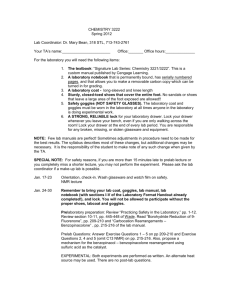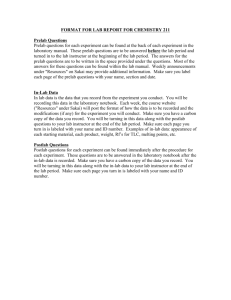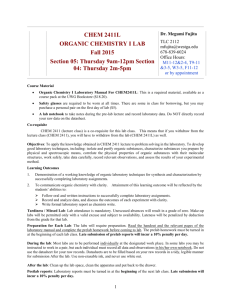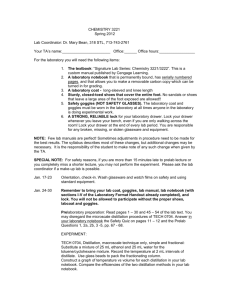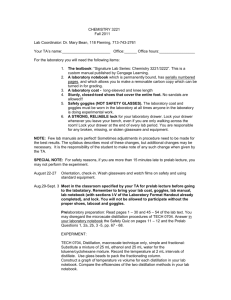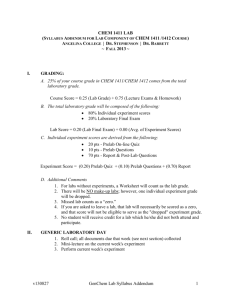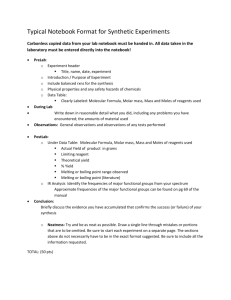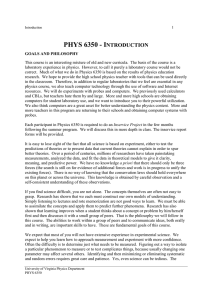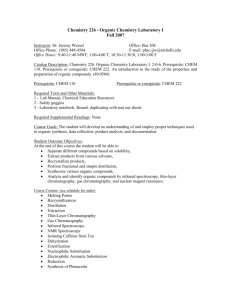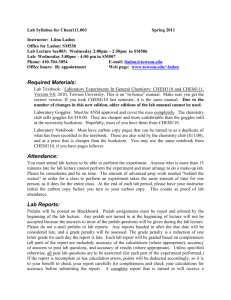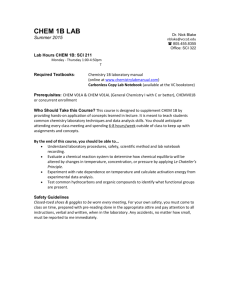CHEMISTRY 3222 FALL 2011 Lab Coordinator: Dr. Mary Bean, 118
advertisement
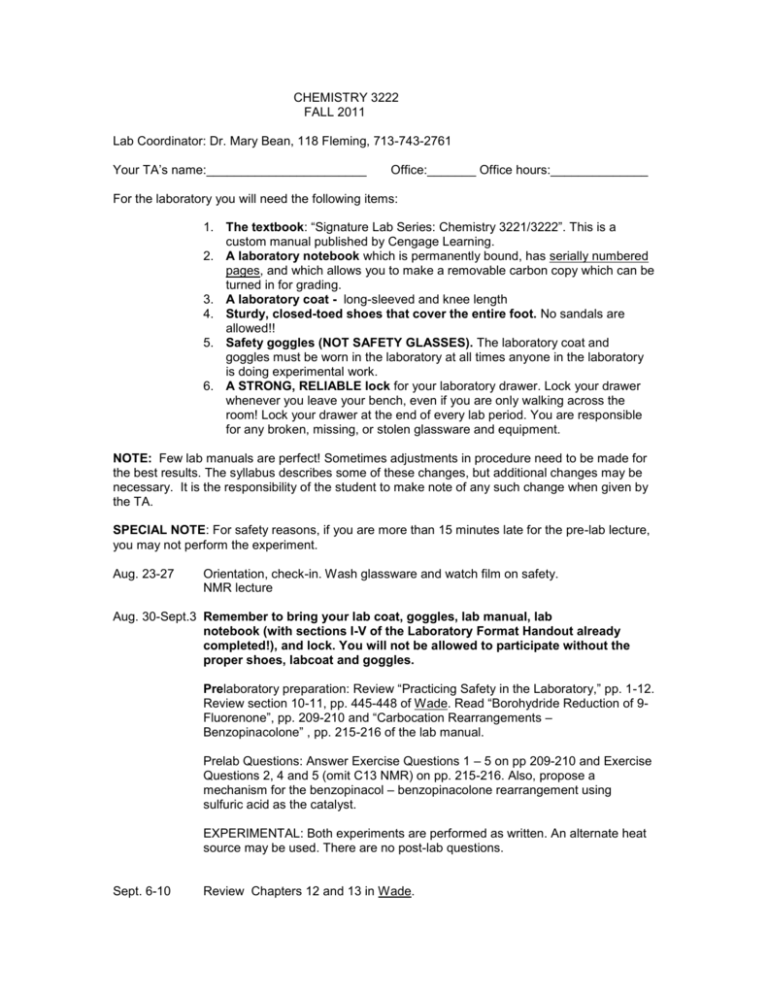
CHEMISTRY 3222 FALL 2011 Lab Coordinator: Dr. Mary Bean, 118 Fleming, 713-743-2761 Your TA’s name:_______________________ Office:_______ Office hours:______________ For the laboratory you will need the following items: 1. The textbook: “Signature Lab Series: Chemistry 3221/3222”. This is a custom manual published by Cengage Learning. 2. A laboratory notebook which is permanently bound, has serially numbered pages, and which allows you to make a removable carbon copy which can be turned in for grading. 3. A laboratory coat - long-sleeved and knee length 4. Sturdy, closed-toed shoes that cover the entire foot. No sandals are allowed!! 5. Safety goggles (NOT SAFETY GLASSES). The laboratory coat and goggles must be worn in the laboratory at all times anyone in the laboratory is doing experimental work. 6. A STRONG, RELIABLE lock for your laboratory drawer. Lock your drawer whenever you leave your bench, even if you are only walking across the room! Lock your drawer at the end of every lab period. You are responsible for any broken, missing, or stolen glassware and equipment. NOTE: Few lab manuals are perfect! Sometimes adjustments in procedure need to be made for the best results. The syllabus describes some of these changes, but additional changes may be necessary. It is the responsibility of the student to make note of any such change when given by the TA. SPECIAL NOTE: For safety reasons, if you are more than 15 minutes late for the pre-lab lecture, you may not perform the experiment. Aug. 23-27 Orientation, check-in. Wash glassware and watch film on safety. NMR lecture Aug. 30-Sept.3 Remember to bring your lab coat, goggles, lab manual, lab notebook (with sections I-V of the Laboratory Format Handout already completed!), and lock. You will not be allowed to participate without the proper shoes, labcoat and goggles. Prelaboratory preparation: Review “Practicing Safety in the Laboratory,” pp. 1-12. Review section 10-11, pp. 445-448 of Wade. Read “Borohydride Reduction of 9Fluorenone”, pp. 209-210 and “Carbocation Rearrangements – Benzopinacolone” , pp. 215-216 of the lab manual. Prelab Questions: Answer Exercise Questions 1 – 5 on pp 209-210 and Exercise Questions 2, 4 and 5 (omit C13 NMR) on pp. 215-216. Also, propose a mechanism for the benzopinacol – benzopinacolone rearrangement using sulfuric acid as the catalyst. EXPERIMENTAL: Both experiments are performed as written. An alternate heat source may be used. There are no post-lab questions. Sept. 6-10 Review Chapters 12 and 13 in Wade. EXPERIMENT: Part 1: You will work the problems in a Spectroscopy Handout. Some problems will be worked with the help of the TA, some will be worked in groups, and some must be worked individually. These problems will be turned in at the end of the lab period. Part 2: You will learn to use the FT – IR and will be introduced to the NMR. One IR spectrum will be turned in with the Spectroscopy Handout. One interpreted NMR will be turned in on the regular due date. Sept. 13-17 Review pp. 460-467 and 494-496 of chapter 11 in Wade. SYNT 725: Oxidizing Methoxybenzyl Alcohol to Methoxybenzaldehyde Using Phase-Transfer Catalysis, pp. 217-229. The microscale procedure will be performed. TLC will be omitted. Prelab Questions: 1-5, pp.231-232. Postlab Questions: 1-7, p. 230. SYNT 726: Two Methods for the Synthesis of Phenacetin, pp. 233-245. Only the semi-microscale Williamson Ether Synthesis will be performed today. The Amide Synthesis will be performed later in the semester. Prelab Questions: 1-4, pp. 249-250. Postlab Questions: 1,2,4,5; p. 248. Sept. 20-24 SYNT 717: The Diels-Alder Reaction of Anthracene with Maleic Anhydride, pp. 251-256. The semi-microscale procedure will be performed. Prelab Questons: 15, pp. 261-262. Postlab Questions: 1-5, p. 260. Sept.27-Oct.1 Handout: The Friedel-Crafts Reaction: Preparation of p-Methoxybenzophenone. Answer the questions given in the handout. (The Friedel-Crafts acylation of mxylene in the lab manual will not be performed.) Oct. 4-8 REAC 716: Nitrating Acetanilide or Methyl Benzoate: Electrophilic Aromatic Substitution, pp. 263-273. Both nitrations will be performed and the substitutions will be compared. Prelab Questions:1-3, p. 273. Postlab Questions: 1-3, p. 271. Oct. 11-15 MIDTERM EXAM SYNT 721: Synthesis of Trans-9-(2-Phenylethenyl)Anthracene: A Wittig Reaction, pp. 295-305. The microscale procedure will be performed. Prelab Questions: 1-4, pp. 307-308. Postlab Questions: 1-4, p. 305. Oct. 18-22 Qualitative Organic Analysis; Classification Tests: pp. 285-293. Omit Parts B, D, and E.You will perform tests on known compounds and an unknown. Your unknown must be identified as a primary, secondary, or tertiary alcohol, an aldehyde, a ketone or a methyl ketone, Answer Exercise questions 1-5 as post-lab questions. Oct. 25-29 SYNT 713: Preparing Isopentyl Acetate by the Fischer Esterification, pp. 312327. The semi-microscale procedure will be performed. Prelab Questions: 1-4, pp. 329-330. Postlab Questions: 1, 2, 5,6; p. 328. SYNT 726: Two Methods for the Synthesis of Phenacetin, The Amide Method, pp. 243-248. The semi-microscale procedure will be performed. Prelab Question 5, p. 250. Postlab Questions: 1, 2, p. 248. Nov. 1-5 SYNT 754: A Multistep Synthesis Sequence: An Aldol Condensation, A Michael Addition, and Ethylene Ketal Formation, pp. 331-350. Only the Aldol Condensation and Michael Addition will be performed. The semi-microscale procedures will be performed. Prelab Questions: 1, 3, 4; pp 349-350. Postlab Questions: 1, 2, 5; pp. 347-348. Nov. 8-12 m-Aminoacetophenone; Selective Reduction of Nitro, pp. 309-311. Answer Exercise Questions 1-4 as postlab questions. Properties of Amines, pp 351-354. Omit Part C. Prelab Questions 1, 3, 5; p. 354 Postlab Questions: 1, 4; p. 354. Important Note: Wash all glassware and make sure that all of the necessary equipment is in your drawer for check-out next week. It is your responsibility to replace anything broken during the semester. Nov. 15-19 Final Exam (Cumulative) and Check-out.
